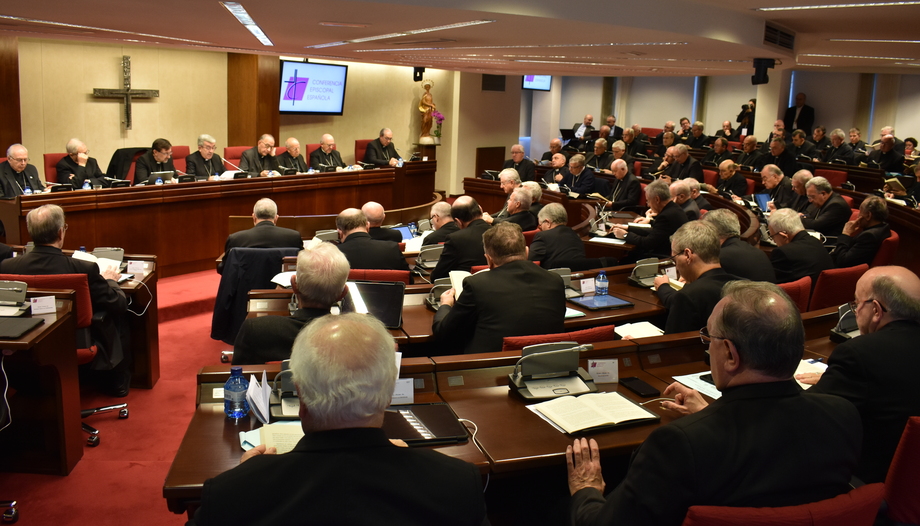The president of the Spanish Episcopal ConferenceMonsignor Luis Argüello opened the plenary session of the Spanish bishops with a speech in which he recalled the tragedy of the DANA and some of the characteristics of our society today.
The Archbishop of Valladolid has described some of the main problems that Spanish society is facing at the moment. The president of the EEC did not miss the opportunity to denounce the economic and cultural reasons that destroy the family, marriages and have brought Spain to a demographic limit. Along with this, the president of the Spanish bishops referred to the reality of immigration: "the Church encourages to address the causes that force people to leave their own land, affirming the right not to emigrate, to fight the organizations that traffic in migrants" and he also made a call to welcome and integrate people who flee to our country in search of better opportunities.
Two Spains
Argüello issued a warning against what he called "a growing 'deficit' of democratic life, characterized by a lack of encounter and dialogue. Looking at Spain, the president of the bishops pointed out "two coordinates that articulate the path of a people: time, we Spaniards find it difficult to reconcile ourselves with our history and, now, the 'democratic' reading of history is an instrument of polarization (artificial maintenance of 'the two Spains') at the service of the conquest or maintenance of power; space, our homeland is inhabited by 'Spains' who share a long history of social and political life expressed in different sounds; today, once again, the difficulties to harmonize a political nation 'of nationalities and regions' resound".
The tragedy of Valencia
Focusing on the flood disaster that occurred in Valencia and Albacete, Argüello recalled that the events experienced show how "neither the State nor the market can save us" and pointed out how "the fraternity exercised in these weeks is an indicator of the goodness that nests in the human soul as the appropriate response to our irremediable vulnerability. (...) In these days we have also seen the rapacity and populism of anti-politics. Therefore, the question remains: who will free us from the original guilt from which greed and domination spring, who will give us hope in the face of death? Many are discovering in these days that in the surrender of life we discover the secret of its meaning".
Argüello has described the "vicious circle with apparent political perplexities: the self-styled progressive parties, critical of the dominant economic system, promote and defend radically unsupportive anthropologies in the field of life, affections and the "empowerment" of partial and unlinked identities, which makes them abandon de facto a proposal for true economic and social innovation; while the parties that refuse to be called conservative and that, even with their small mouths, claim to defend life, family and subjectivity of society, promote and defend an economic system and a way of exercising politics that promotes the same anthropological practice that their political adversaries promote without complexes. An individualistic conception of the citizen unites them, even unknowingly or knowingly. And their political practices, very much at odds in the forum and in the media, complement and feed back on each other".
Fundamental questions
The President of the EEC questioned the roots of current social, cultural and political life, stressing that the fundamental question is always: "The question is perhaps not whether capitalism works, but what kind of humanity it produces; the question is not whether democracy is the best system of government, but, together with the welfare state, what kind of citizens it generates; the question is not whether it makes sense to innovate, but what does human progress mean. In short, we have to ask ourselves the central question: what is it to be a man, male and female?"
After this analysis of Spanish society, the President of the EEC focused his speech on the topics to be addressed in this Plenary of the Spanish Bishops. In relation to synodality, Bishop Argüello recalled that "the proclamation of the Gospel concerns us all and together we must discern what the Lord suggests to promote the mission, make the appropriate decisions, and also provide for evaluation and accountability". The next congress on vocations and the promotion of a vocational dynamic in Spain will be another of the key themes of these days. We are called to make a turn in our pastoral proposal according to the vocational anthropology that we recognize and announce", said the Archbishop of Valladolid, who highlighted the work of the Spanish seminaries whose reform and restructuring will be discussed in this plenary session.
The President of the Bishops closed his speech with a call to hope, in line with the upcoming Jubilee of the Catholic Church: "the moment we are living can become a great opportunity! It will be if our enlightened eyes discover the Lord's passage through history".







